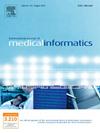基于多中心临床数据的肺癌脑转移患者生存预测的机器学习预后模型的开发
IF 4.1
2区 医学
Q2 COMPUTER SCIENCE, INFORMATION SYSTEMS
International Journal of Medical Informatics
Pub Date : 2025-06-26
DOI:10.1016/j.ijmedinf.2025.106025
引用次数: 0
摘要
方法准确预测肺癌脑转移(LCBM)患者的预后对临床决策至关重要。本研究整合了SEER数据库(n = 2624)和哈尔滨医科大学肿瘤医院(n = 362)的数据,开发了一种基于机器学习的预后预测工具。通过Cox回归分析选择预后因素,构建XGBoost、Random Forest、Logistic regression等8个预测模型。使用AUC、学习曲线和PR曲线评估表现,通过倾向评分匹配和Kaplan-Meier生存分析探讨淋巴结转移的影响。结果确定的危险因素包括年龄≥60岁、T3分期和多器官转移,保护因素包括女性和家庭收入≥10万美元。XGBoost模型表现出优异的性能,平均auc分别为0.957(模型1)和0.550(模型2)。XGBoost-Surv模型在训练集(C-index = 0.653, AUC = 0.731)和测试集(C-index = 0.634, AUC = 0.705)上均表现稳定。淋巴结转移显著影响预后(p <;0.001),但转移阶段差异无统计学意义(p = 0.935)。结论基于多中心数据建立的XGBoost模型可有效预测LCBM患者的生存结局,其中淋巴结转移可作为独立的预后指标。该模型为个性化治疗决策提供了可靠的工具。本文章由计算机程序翻译,如有差异,请以英文原文为准。
Development of a machine learning-based prognostic model for survival prediction in patients with lung cancer brain metastases using multicenter clinical data
Methods
Accurate prognosis prediction for lung cancer brain metastasis (LCBM) patients is critical for clinical decision-making. This study integrates data from the SEER database (n = 2624) and Harbin Medical University Cancer Hospital (n = 362) to develop a machine learning-based prognostic prediction tool. Prognostic factors were selected through Cox regression analysis, and eight prediction models, including XGBoost, Random Forest, and Logistic Regression, were constructed. Performance was evaluated using AUC, learning curves, and PR curves, while the impact of lymph node metastasis was explored through propensity score matching and Kaplan-Meier survival analysis.
Results
Risk factors identified included age ≥60 years, T3 stage, and multiple organ metastases, while protective factors included female gender and household income ≥$100,000. The XGBoost model demonstrated superior performance, with mean AUCs of 0.957 (Model 1) and 0.550 (Model 2). The XGBoost-Surv model showed stable performance in both the training set (C-index = 0.653, AUC = 0.731) and the test set (C-index = 0.634, AUC = 0.705). Lymph node metastasis significantly affected prognosis (p < 0.001), though differences in metastatic stages were not statistically significant (p = 0.935).
Conclusion
The XGBoost model developed from multicenter data effectively predicts survival outcomes in LCBM patients, with lymph node metastasis serving as an independent prognostic indicator. This model provides a reliable tool for personalized treatment decision-making.
求助全文
通过发布文献求助,成功后即可免费获取论文全文。
去求助
来源期刊

International Journal of Medical Informatics
医学-计算机:信息系统
CiteScore
8.90
自引率
4.10%
发文量
217
审稿时长
42 days
期刊介绍:
International Journal of Medical Informatics provides an international medium for dissemination of original results and interpretative reviews concerning the field of medical informatics. The Journal emphasizes the evaluation of systems in healthcare settings.
The scope of journal covers:
Information systems, including national or international registration systems, hospital information systems, departmental and/or physician''s office systems, document handling systems, electronic medical record systems, standardization, systems integration etc.;
Computer-aided medical decision support systems using heuristic, algorithmic and/or statistical methods as exemplified in decision theory, protocol development, artificial intelligence, etc.
Educational computer based programs pertaining to medical informatics or medicine in general;
Organizational, economic, social, clinical impact, ethical and cost-benefit aspects of IT applications in health care.
 求助内容:
求助内容: 应助结果提醒方式:
应助结果提醒方式:


